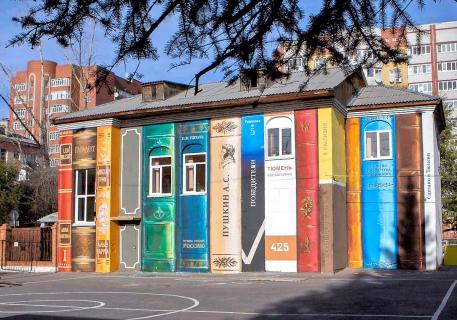
by Amanda Boldenow
Army brats have difficulty answering the classic getting-to-know-you question, “Where are you from?” When you went to 12 different schools, figured out how to make school lunches out of a hotel mini-bar in a foreign country, and never quite shook the title of “new kid,” the question invariably merits the answer, “It’s complicated.”
I usually default to the origins of my immediate family and the end-cap of my formal education (Arkansas, woo pig). But in truth, the spaces that nurture a nomad are not found in cities or states; they’re in the nests we made and carried with us following each flight to someplace new. I nested in bookstores and libraries. The back of the PX newsstand where I first caught the gleam of a hardcover Nancy Drew. The bookstore with the 1900s storefront in Ft. Leavenworth, Kansas, where my mom let me pick out American Girl and Hank the Cow Dog books in sequence. My “secret” spot in the Fayetteville High School library—the aisle between the modern and Renaissance poetry— where I first discovered John Donne and Adrienne Rich. I can best tell you “where I’m from” by the stories I loved and the spaces in which I discovered them.
 This sort of piecemeal background feeds well into my tendency towards collections. At any given moment, these collections have included not just books, but also dolls, seashells, embroidery flosses, and for far too long, those little erasers for sale at book fairs that were both too cute and too impractical to actually use.
This sort of piecemeal background feeds well into my tendency towards collections. At any given moment, these collections have included not just books, but also dolls, seashells, embroidery flosses, and for far too long, those little erasers for sale at book fairs that were both too cute and too impractical to actually use.
I’ve come to admire fellow collectors, including collectors of stories. Horace Beck, a Naval veteran and professor of American literature, compiled one of the most comprehensive collections of marine folklore, and one of my favorite anthologies, in his book, Folklore and the Sea. In his introduction, Beck speaks of the stories he spent years compiling in the same way an Army brat could describe the compiling of a life scattered by school districts and continents:
“The life of marine folklore is like the life of a breaker. The sea gathers together, swells, crests, and rushes ashore to break, withdraw, and re-form. So folklore stems from little incidents to which others accrete for a while and then the mass breaks apart, but the pieces re-form again in another shape and the act is repeated.”
Living and writing are like that. All of the little pieces, moments, and memories come together to form who you are or what your work is for a while. But then the inevitable shift occurs and what was built breaks apart, re-forming again and again. If you’re lucky in life and writing, the thing that re-forms is made stronger and better than what it was before. But if it isn’t, the sea will always storm again, providing yet another chance for regeneration and renewal.
Beck’s book recounts folklore from all aspects of the maritime tradition, from shipbuilding to superstitions to sea serpents, presented intermittently in his own voice and those of the old salts and fishwives he interviewed up and down the New England coast. I may be landlocked now, but I still find a sense of home in the pages Beck dedicated his life to compiling and preserving. Stories are one of the few things that make the sea and its seemingly infinite depths accessible to man:
“Because people lack gills or other equipment to allow them to live upon the sea, man is always essentially a stranger to its surface.”
Sometimes, it feels like man lacks the gills or other equipment needed to plumb the true depths of the world and our own experiences in it, a sentiment that can leave a person (or at least me) overwhelmed by its mysteries and nuances. But stories and folklore are the life raft, the snorkel, the scuba gear or magic gillyweed that lets us dive into the richness of life’s experiences. Stories let us feel at home in all that vastness.
This post is part of our annual Lit Matters series, in which writers and readers express why supporting and elevating literary arts—the mission of Lighthouse Writers Workshop— is important to them. If you agree, consider supporting Lighthouse on Colorado Gives Day. Mark your calendar for December 8 or schedule your gift now. Thank you!
Amanda Boldenow is a grant writer and web master for Longmont non-profit TLC Learning Center. A former high school English teacher, she is a graduate of the Lighthouse Book Project and a contributing blogger to speculative fiction website FictionUnbound.com. She maintains her home on the web at AmandaBoldenow.com and may or may not still have a collection of produce shaped mini-erasers.

